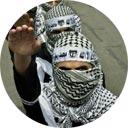War is called many things: brutal, cruel, wasteful and vicious among others. Yet as Sahar Khalifeh illustrates in Wild Thorns war is, above all, absurd. Wild Thorns is about war. It is about war within the Palestinian community, as well as war between the Palestinian and Israeli communities. It is about the twin absurdities that can come out of idealism and pragmatism. The Occupied West Bank of 1972 is described as a society under assault from the outside and the inside. Yet that society, despite the misfortunes of its citizens, soldiers on. Although a novel is by definition not history, an accurate portrayal of society, even if fictional, can provide real historical insight.
The interior discussion of Wild Thorns boils down to one question: how can the Palestinian people survive under occupation? The two cousins, Usama and Adil, represent the two primary approaches. Usama is the young idealist, just returned from the Gulf. He holds that survival and political independence are one and the same. So long as the Occupation endures, Usama’s sanity and existence depends upon resistance. Adil is Usama’s foil, a pragmatist of necessity, because the responsibility for the family’s material survival rests on his shoulders. For him survival requires food on the table, and that means that the Occupation must be dealt with on its own terms.
The rift between Usama and Adil also exists at a higher level. Usama is a former emigrant. He worked in the Gulf. He is politically active, tied body and soul to the PLO. What Usama lacks is a real connection to the ‘people’ of Palestine. Indeed, he despises many of those he meets, either as materialists, like Shahada, or collaborators, like Zuhdi, or both. Usama convinces himself that he has no stake in the humdrum day-to-day lives of Palestinians. The ‘revolution’ is everything to him, to the point that if his cousin, Adil, is in the bus that Usama blows up, Usama thinks he can accept the loss.
Usama stands for the politically active Palestinian expatriates who became particularly important in the wake of the spectacular 1967 defeat of Nasser and pan-Arabism. Yasser Arafat is of course the most notorious member of this group. He went to university in Egypt after 1948 and worked in the Gulf for a few years. Thus by the time he began directing PLO operations in 1968, he had not been in the country for two decades, and likely had little connection to those who had remained behind. It is thus unsurprising that he was quite willing to conduct risky cross-border raids and attacks into Israeli-controlled areas. It was the people there, not him, who paid the price when Israel retaliated.
Usama’s polar opposite, Adil, is stuck with the less-rewarding and ultimately more difficult task of keeping a large family financially solvent. His responsibility to the family outweigh other considerations, and so while he is hardly thrilled, he is willing to work in Israel as a laborer, if that’s what is necessary to make ends meet. Adil is a pragmatist not because it’s the ideology that he finds most attractive, but because it’s the likeliest method to keep food on the table.
For his part, Adil’s position was certainly not unique. Faced with limited economic opportunities in the West Bank, high inflation and crippling Israeli taxation, an enormous number of people undoubtedly did what he did. To Usama they are of course collaborators and traitors, but it is likely that they would have been equally happy with an independent Palestine, had they seen a means of achieving that did not require their families to starve.
It is this difference in attitudes that forces many social cleavages within Palestinian society to the forefront of the book. Usama is repeatedly derided for his neat clothing. To many, his attire indicates that he is well enough off that he can afford to ‘make revolution.’ They on the other hand cannot, and they resent having their patriotism questioned. This comes out again and again. Usama’s encounter with the bread seller is a perfect example of this. Usama assails him for selling bread made in Israel. The bread seller responds: “Look friend, we’re not the first to work with them. While we were still wandering the streets of Nablus looking for bread to eat, your kind were running around Tel Aviv looking for companies to award you franchises so you could sell their products (68).”
The upper class is fatally compromised in the eyes of the bread seller. They form a ‘comprador bourgeoisie’, always willing to put Israeli pounds before Palestinian people. They are illegitimate. Obviously the problem with this is that with the traditional community leaders thoroughly discredited, who will move in and take their place?
Interestingly enough, Usama would probably agree with many of the bread seller’s criticisms. He has no patience for his grandfather who spends day and night complaining to journalists. A grandfather, it may be added, who was a member of the pre-Occupation elite. Usama wants action, not talk, and he chides Adil repeatedly for this. In point of fact, Usama is supposed to be part of a new resistance movement. The PLO was founded in 1964, and certainly once Yasser Arafat took over, it remained largely free of the taint of the previous generation of failed leaders. As a representative of this emerging organization, Usama is supposed to stand for the new, not the old.
The obvious background to all this is the Occupation, which added its own dose of absurdity. Palestinians were taxed heavily with ‘liberty taxes’, which went to pay for their continued occupation. The taxes they paid for food went to subsidize Israeli agriculture. The money they were supposed to contribute to the Histadrut was used to maintain high wages for the Israelis. The list goes on.
Adil and Zuhdi highlight the impossibilities of the situation. Adil realizes that even the Jewish workers are not treated well, in absolute terms. They too are being exploited, he decides. Yet when Zuhdi and Shlomo end up in a fight, and Adil is unable to stop it, he becomes an eager participant, enraged that his efforts at “Middle East peace” had been rebuffed so rudely. It is later Adil who comforts the Israeli wife of the officer that his brother, Usama, had killed. Yet it is also he who tears the epaulets off the dead officer’s uniform, because of what they symbolize. Further, it is Adil who in the end pays the price of Usama’s recklessness, and it is the house he worked so hard to keep that the Israelis demolish.
Nationalism in this story is not a hero but a villain. It is nationalism that prompts Usama and Basil to destroy their family. It is nationalism that kills Zuhdi. It is nationalism that utterly fails to offer any practical solutions to day-to-day problems, serving instead as an absurd chimera for the gullible and the na´ve. Nationalism is exhibited as being devoid of any foundation, and thus merely another castle in the sky on which the foolish dote.
Instead, what one sees is a form of resigned solidarity. Bonds between individuals tend to be local. There are no national networks save, perhaps, the PLO. While people locally look after each other, that’s the extent of it. Meanwhile, social fragmentation runs deep. The poor distrust the well off. The well off disdain the poor. In terms of organization the society seems scarcely less fractious than it did in the years after the Arab revolt. On the part of the ‘revolutionaries’, there is a brutal contempt for those who try merely to live their lives.
It is worth mentioning that the Occupation was consciously designed to have these sorts of effects. Israel most certainly had no intention of allowing nationalism to spread if it could prevent it. Their policies were intended to do more than undermine the Palestinian economy. By weakening local businesses, they made people dependent on Israel for goods and employment. Dependency, as we saw with Adil, clearly reduces political tendencies. The policy of house demolitions had much the same effect. The consequences of living under the same roof as a PLO fighter for any period would be homelessness. Once homeless, some would no doubt blame the PLO. While the Israelis did not cause the deep divisions in Palestinian society, they were happy to profit from them.
At a broader historical level, Wild Thorns offers a plausible explanation for the seeming inaction of Palestinian society under Occupation until the late 1980s. The divisions detailed were not the sort of things easily papered over, and the forced dependence, combined with isolation and partial estrangement from those most eager to fight the Occupation, made matters doubly difficult. The political response of Palestinians was to some degree a victim of circumstance as well: those who could resist by sacrificing did, those who couldn’t didn’t. These are of course generalizations, but in a good number of cases, they seem justified.
Survival within Wild Thorns boils down to navigating the many treacherous conflicts afoot in the Occupied territories. On the one hand all fought Israel, since all attempted to continue to live in the area. Even passive Adil was fighting, for by keeping his family alive, and in Palestine, he was opposing Israeli policy. At the same time, Palestinians were fighting each other, over strategy, over leadership and over the means of resistance. From these struggles to achieve the (nearly) impossible, the absurd emerges as a natural outgrowth. It is in such a situation that war between those who should be friends becomes as vicious as war between enemies. Fortunately, Sahar Khalifeh indicates, Palestinians in the Occupied territories in 1972 had adapted to surviving the almost impossible situation. If they could not completely reconcile black and white, they came as close as was humanly possible.

